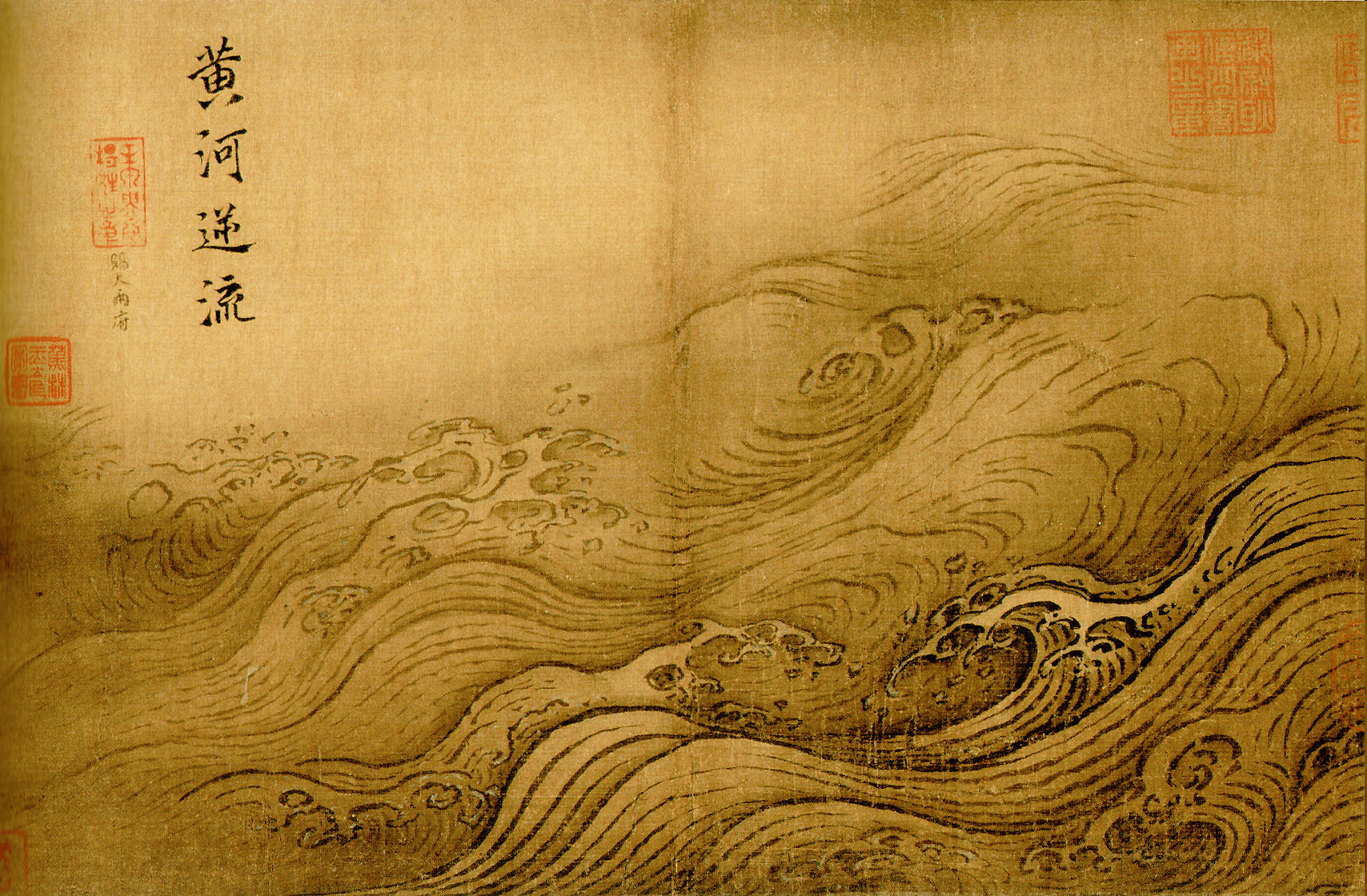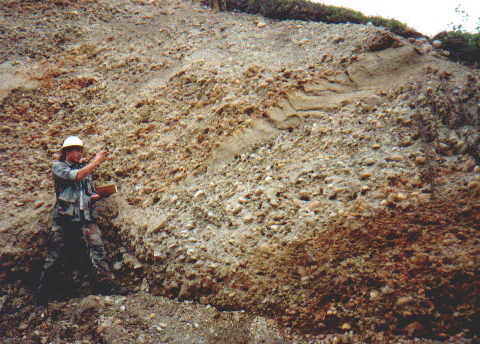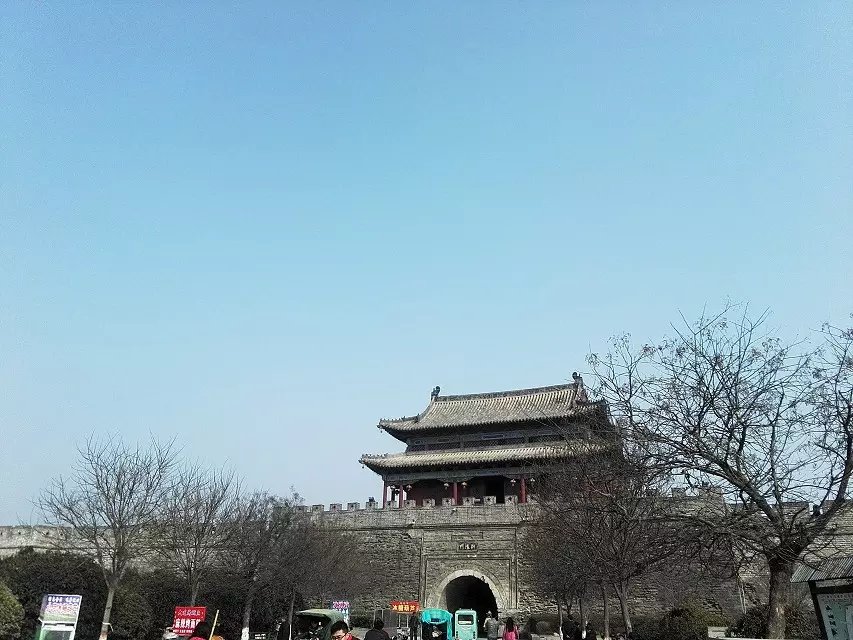|
Zhang Changshou
Zhang Changshou (; 6 May 1929 – 30 January 2020) was a Chinese archaeologist who served as vice director of the Institute of Archaeology, Chinese Academy of Social Sciences (CASS). He was a corresponding member of the German Archaeological Institute and an honorary member of the CASS. Life and career Zhang was born 6 May 1929 in Shanghai, Republic of China. He studied in Christian missionary schools as a child and entered St. John's University, Shanghai in 1948. He transferred to Yenching University in Beijing in 1950, graduating in July 1952 with a degree in history. He taught at Liancheng Secondary School (连成中学), an affiliated school of Tsinghua University, for the next four years. In July 1956, he transferred to the Institute of Archaeology, then under the Chinese Academy of Sciences (part of the Chinese Academy of Social Sciences since 1977), and spent the rest of his career in field archaeology and research of the Shang and Zhou dynasties of ancient China. ... [...More Info...] [...Related Items...] OR: [Wikipedia] [Google] [Baidu] |
Zhang (surname)
Zhang () is the third most common surname in China and Taiwan (commonly spelled as "Chang" in Taiwan), and it is one of the most common surnames in the world. Zhang is the pinyin romanization of the very common Chinese surname written in simplified characters and in traditional characters. It is spoken in the first tone: ''Zhāng''. It is a surname that exists in many languages and cultures, corresponding to the surname 'Archer' in English for example. In the Wade-Giles system of romanization, it is romanized as "Chang", which is commonly used in Taiwan; "Cheung" is commonly used in Hong Kong as romanization. It is also the pinyin romanization of the less-common surnames (''Zhāng''), which is the 40th name on the '' Hundred Family Surnames'' poem. There is the even-less common (''Zhǎng''). was listed 24th in the famous Song-era '' Hundred Family Surnames'', contained in the verse 何呂施張 (He Lü Shi Zhang). Today, it is one of the most common surnames in the worl ... [...More Info...] [...Related Items...] OR: [Wikipedia] [Google] [Baidu] |
Predynastic Zhou
The Predynastic Zhou or Proto-Zhou (; ) refers to the state of Zhou that existed in the Guanzhong region of modern Shaanxi province during the Shang dynasty of ancient China, before its conquest of Shang in 1046/45 BC which led to the establishment of the Zhou dynasty. It was ruled by the Ji 姬 clan. History According to Sima Qian, it was established by Gugong Danfu when he relocated his clan from their home of Bin to a new settlement along the Wei River.Sima Qian. ''Records of the Grand Historian''. His two elder sons Taibo and Zhongyong were said to have abandoned the territory and fled south to establish Wu on the lower Yangtze. His youngest son Jili then inherited Zhou and expanded it with numerous campaigns against the Rong "barbarians" around Shang. His power threatened King Wen Ding and he was tricked into an ambush at a place called Saiku (). Jili's son King Wen was likewise imprisoned by King Zhou of Shang at Youli before being ransomed by other nobles. In some ac ... [...More Info...] [...Related Items...] OR: [Wikipedia] [Google] [Baidu] |
21st-century Archaeologists
The 1st century was the century spanning AD 1 ( I) through AD 100 ( C) according to the Julian calendar. It is often written as the or to distinguish it from the 1st century BC (or BCE) which preceded it. The 1st century is considered part of the Classical era, epoch, or historical period. The 1st century also saw the appearance of Christianity. During this period, Europe, North Africa and the Near East fell under increasing domination by the Roman Empire, which continued expanding, most notably conquering Britain under the emperor Claudius (AD 43). The reforms introduced by Augustus during his long reign stabilized the empire after the turmoil of the previous century's civil wars. Later in the century the Julio-Claudian dynasty, which had been founded by Augustus, came to an end with the suicide of Nero in AD 68. There followed the famous Year of Four Emperors, a brief period of civil war and instability, which was finally brought to an end by Vespasian, ninth Roman emperor ... [...More Info...] [...Related Items...] OR: [Wikipedia] [Google] [Baidu] |
2020 Deaths
This is a list of deaths of notable people, organised by year. New deaths articles are added to their respective month (e.g., Deaths in ) and then linked here. 2022 2021 2020 2019 2018 2017 2016 2015 2014 2013 2012 2011 2010 2009 2008 2007 2006 2005 2004 2003 2002 2001 2000 1999 1998 1997 1996 1995 1994 1993 1992 1991 1990 1989 1988 1987 See also * Lists of deaths by day * Deaths by year {{DEFAULTSORT:deaths by year ... [...More Info...] [...Related Items...] OR: [Wikipedia] [Google] [Baidu] |
1929 Births
Nineteen or 19 may refer to: * 19 (number), the natural number following 18 and preceding 20 * one of the years 19 BC, AD 19, 1919, 2019 Films * ''19'' (film), a 2001 Japanese film * ''Nineteen'' (film), a 1987 science fiction film Music * 19 (band), a Japanese pop music duo Albums * ''19'' (Adele album), 2008 * ''19'', a 2003 album by Alsou * ''19'', a 2006 album by Evan Yo * ''19'', a 2018 album by MHD * ''19'', one half of the double album '' 63/19'' by Kool A.D. * ''Number Nineteen'', a 1971 album by American jazz pianist Mal Waldron * ''XIX'' (EP), a 2019 EP by 1the9 Songs * "19" (song), a 1985 song by British musician Paul Hardcastle. * "Nineteen", a song by Bad4Good from the 1992 album '' Refugee'' * "Nineteen", a song by Karma to Burn from the 2001 album '' Almost Heathen''. * "Nineteen" (song), a 2007 song by American singer Billy Ray Cyrus. * "Nineteen", a song by Tegan and Sara from the 2007 album '' The Con''. * "XIX" (song), a 2014 song by Slipk ... [...More Info...] [...Related Items...] OR: [Wikipedia] [Google] [Baidu] |
Yellow River
The Yellow River or Huang He (Chinese: , Mandarin: ''Huáng hé'' ) is the second-longest river in China, after the Yangtze River, and the sixth-longest river system in the world at the estimated length of . Originating in the Bayan Har Mountains in Qinghai province of Western China, it flows through nine provinces, and it empties into the Bohai Sea near the city of Dongying in Shandong province. The Yellow River basin has an east–west extent of about and a north–south extent of about . Its total drainage area is about . The Yellow River's basin was the birthplace of ancient Chinese, and, by extension, Far Eastern civilization, and it was the most prosperous region in early Chinese history. There are frequent devastating floods and course changes produced by the continual elevation of the river bed, sometimes above the level of its surrounding farm fields. Etymology Early Chinese literature including the '' Yu Gong'' or ''Tribute of Yu'' dating to the Warrin ... [...More Info...] [...Related Items...] OR: [Wikipedia] [Google] [Baidu] |
Alluvium
Alluvium (from Latin ''alluvius'', from ''alluere'' 'to wash against') is loose clay, silt, sand, or gravel that has been deposited by running water in a stream bed, on a floodplain, in an alluvial fan or beach, or in similar settings. Alluvium is also sometimes called alluvial deposit. Alluvium is typically geologically young and is not consolidated into solid rock. Sediments deposited underwater, in seas, estuaries, lakes, or ponds, are not described as alluvium. Floodplain alluvium can be highly fertile, and supported some of the earliest human civilizations. Definitions The present consensus is that "alluvium" refers to loose sediments of all types deposited by running water in floodplains or in alluvial fans or related landforms. However, the meaning of the term has varied considerably since it was first defined in the French dictionary of Antoine Furetière, posthumously published in 1690. Drawing upon concepts from Roman law, Furetière defined ''alluvio ... [...More Info...] [...Related Items...] OR: [Wikipedia] [Google] [Baidu] |
Henan
Henan (; or ; ; alternatively Honan) is a landlocked province of China, in the central part of the country. Henan is often referred to as Zhongyuan or Zhongzhou (), which literally means "central plain" or "midland", although the name is also applied to the entirety of China proper. Henan is a birthplace of Han Chinese civilization, with over 3,200 years of recorded history and remained China's cultural, economic and political center until approximately 1,000 years ago. Henan Province is home to many heritage sites, including the ruins of Shang dynasty capital city Yin and the Shaolin Temple. Four of the Eight Great Ancient Capitals of China, Luoyang, Anyang, Kaifeng and Zhengzhou, are in Henan. The practice of tai chi also began here in Chen Jia Gou Village (Chen style), as did the later Yang and Wu styles. Although the name of the province () means "south of the ellowriver.", approximately a quarter of the province lies north of the Yellow River, also known as the H ... [...More Info...] [...Related Items...] OR: [Wikipedia] [Google] [Baidu] |
Shangqiu
Shangqiu (), alternately romanized as Shangkiu, is a city in eastern Henan province, Central China. It borders Kaifeng to the northwest, Zhoukou to the southwest, and the provinces of Shandong and Anhui to the northeast and southeast respectively. Its population was 7,816,831 inhabitants as of the 2020 Chinese census whom 2,831,814 lived in the built-up (''or metro'') area made up of two urban districts (Liangyuan and Suiyang) and Yucheng county now being conurbated. Shangqiu and surrounding area was an important base for the Shang dynasty (c. 1600 – c. 1046 BC), and the city itself was established more than three millennia ago. Shangqiu has grown significantly in recent years. It is located at an important location at the junction of several major railways, making it a major regional transportation hub. History The history of Shangqiu ("Hills of Shang") is closely related to the very beginning of Chinese history. The tradition dates back to the Three August Ones and Five Em ... [...More Info...] [...Related Items...] OR: [Wikipedia] [Google] [Baidu] |
Harvard University
Harvard University is a private Ivy League research university in Cambridge, Massachusetts. Founded in 1636 as Harvard College and named for its first benefactor, the Puritan clergyman John Harvard, it is the oldest institution of higher learning in the United States and one of the most prestigious and highly ranked universities in the world. The university is composed of ten academic faculties plus Harvard Radcliffe Institute. The Faculty of Arts and Sciences offers study in a wide range of undergraduate and graduate academic disciplines, and other faculties offer only graduate degrees, including professional degrees. Harvard has three main campuses: the Cambridge campus centered on Harvard Yard; an adjoining campus immediately across Charles River in the Allston neighborhood of Boston; and the medical campus in Boston's Longwood Medical Area. Harvard's endowment is valued at $50.9 billion, making it the wealthiest academic institution in the world. Endow ... [...More Info...] [...Related Items...] OR: [Wikipedia] [Google] [Baidu] |





